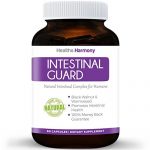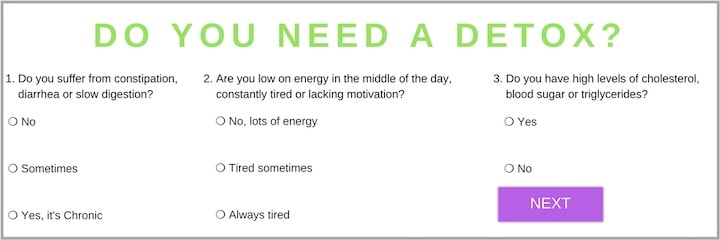
Everybody can have parasites…
If you have traveled… if you eat meat or fish… if you have pets… if you have kids… if you don’t wash your hands after you touch objects…
Even the healthiest people can be infected with intestinal worms.
- Do you feel bloated after eating?
- Do you suffer from constipation?
- Do you crave sugar, bread, and pasta?
- Do you have strong body odor or suffer from skin problems?
- Do you have anxiety and a hard time sleeping at night?
You may be infected with intestinal parasites or worms!
What are Parasites?
A parasite is an organism that lives inside an animal and feeds off of him. Humans are not immune to these parasitic infections. They are most commonly transmitted through contaminated feces, water and food, poor hygiene and the contact with our pet.
Intestinal parasites can be divided into 2 groups: Protozoans and Helminths.
Protozoan infections are usually the ones causing “traveler’s diarrhea”, like Giardia lamblia and E.Coli, and life-threatening infections like malaria.
People get infected with protozoan parasites from contaminated water or food, or from a mosquito bite.
Protozoa are one-cell organisms that can multiply in the human body and cause serious health problems. They can migrate from your lungs to your intestines, and then to different organs and joints, causing infections and inflammation.
When you do a parasite cleanse, you will not see any protozoans leaving your body. They are only visible through a microscope.
Intestinal Worms
Helminths are worms of all shapes and sizes that lay eggs and multiply in your gut. Their eggs cannot be seen but the adult worms are easy to see with your naked eye.
Worms are like leeches. They survive in your gut by eating all your nutrients (certain parasites also suck your blood), creating deficiencies and lowering your immune system.
Killing parasites is so important if you wish to regain control of your body and be healthy. Common infections in humans are caused by:
- Roundworms (or threadworms in the UK)
- Pinworms
- Tapeworms
- Whipworms
- Hookworms
Parasite Symptoms
Some people have parasites for years without having any symptoms. And it makes sense! What is the purpose of a parasite? A parasite is an organism that lives off your nutrients without being noticed. If you know its there, you’ll try to get rid of it!
So, parasites are quiet. They just lay in your intestines and eat the food that you eat. And they LOVE sugar. They eat all the sugary food you love. And they tell you to eat more and more every day.
But they multiply so fast that at some point, you’ll have to notice that something isn’t right. If you pay attention to the signs your body is sending you, you’ll realize that you too have parasites!
Common symptoms of parasites and worms
- Constipation
- Abdominal pain
- Bloating
- Diarrhea
- Gas
- Itchy anus
- Hair Loss
- Irritability
- Weight gain
- Fatigue
- Insomnia
- Constant hunger
- Sugar cravings
- Iron-deficiency anemia
- Migraines
- Worms in the stool
- Skin Rashes
- Inability to gain weight
During our 7-day program, people often pass worms while doing an enema. This is because our program kills parasites naturally in a matter of days!
Click here to see parasites pictures that were taken by OM Detox clients. (Warning: graphic images, sometimes containing feces)
Our program mimics the mechanism of action of an anti-parasite pill your doctor would give you. And we’ll explain how later. But first, let’s look at the different types of worms and how you can catch them.

Common Types of Worms
Pinworms
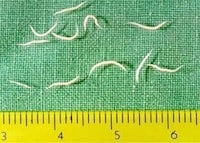
Pinworms (enterobiasis or oxyuriasis) are often spread by children at daycare centers and schools and are highly contagious. 1 out of 3 American children will get a pinworm infection in their lives.
Pinworm infections happen when someone ingests food or liquid that is contaminated with feces (the eggs of the pinworms are in the feces). It can be as simple as someone touching an object that was touched by an infected person, like the shopping cart or the bus handles…
Once the eggs are ingested, they hatch in the first part of the small intestine (in the duodenum), while adult pinworms live in the colon (large intestine). Female pinworms usually live for 5 to 13 weeks, while males live for about 7 weeks.
Pinworm symptoms include having an itchy anus at night, a sensation of crawling and sometimes pain. This is caused by the female moving to the anus to deposit her eggs around that area, usually at night time. Both worms and the eggs cause the itchiness.
With poor hygiene, a person scratches and transfer the eggs to the fingers. Then the eggs can be passed around through bedding, clothes, a toilet seat, toys…They can be transferred from fingers to food or liquids. The eggs can also be inhaled and swallowed later when dust containing eggs is dispersed (Eg. when bed sheets are shaken). Pinworm eggs can live for up to three weeks in your house!
Kids can be infected easily because they often put objects in their mouths. They then infect the whole family. It is literally impossible to prevent pinworm infections!
Since the worms are rarely seen and that their eggs are not passed in the stool, detecting a pinworm infection usually requires a “Scotch tape test”. Clear tape is applied in the morning on the host’s anus, to collect eggs that can be identified under a microscope.
Large Roundworms (Ascaris)
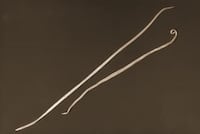
Roundworms (nematodes), infect humans through contaminated water and soil and can measure from 1 millimeter to 1 meter.
An Ascaris infection (ascariasis) is the most common infection, and it usually happens when someone eats food grown in soil that has been mixed with human waste, or from eating raw food that was cleaned with contaminated water, or simply by drinking water that contains roundworm eggs.
Ascariasis is the most common infection in the world. It is usually seen in tropical climates. In some regions, nearly 95% of the population is infected.
Ascaris worms usually don’t spread in developed countries. However, international travelers often bring them back with them! If you have traveled to Asia, India, Africa or Central America or South America, you probably have Ascaris worms living in your gut.
First, the eggs are ingested and mature into larva in the small intestine. They penetrate the intestinal mucosa and enter the bloodstream, traveling through the right heart to the lungs.
They are then coughed up and swallowed. This process may take up to two weeks and cause flu-like symptoms.
The adult worms live in the small intestine, where they feed and produce eggs. They can live for a year or more, and can measure 15 to to 35 cm!
The common signs and symptoms of Roundworms are:
- coughing
- shortness of breath
- abdominal cramping
- bloating
- constipation
- nausea
- diarrhea
- weight loss or weight gain
- fatigue
- blood in stool
- the presence of worms in the stool
- vomiting
Ascariasis can be diagnosed by identification of eggs in the stool, which may occur only 60-70 days after infection. So this means that many people that have symptoms go get tested too early, and have their stool exam come back negative!
Learn more about Ascaris, the largest roundworm.
Whipworms
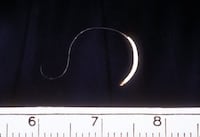
A Whipworms infection, also called trichuriasis, is caused by a parasite called Trichuris trichiura, or whipworm.
Whipworms enter the human body through contaminated food and water. When the eggs are swallowed, the larvae incubate in the small intestine and then attach themselves to the colon, the appendix, and the anus. They start producing eggs after 3 months living in the host.
Adult whipworms measure from 30 to 50 mm. They are thin with a curved end that looks like a whip.
Whipworms are mostly seen in children and in warmer climates or areas with poor hygiene. It is estimated that about 800 million people are infected worldwide.
The common signs and symptoms of Whipworms are:
- bloody diarrhea
- fecal incontinence
- painful defecation
- abdominal pain
- headaches
- weight loss
- fatigue
- anemia
- nausea and vomiting
Hookworms
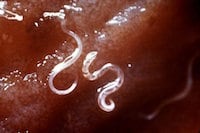
Hookworms infect 25% of the world’s population. There are two types of Hookworms (nematodes); Ancyclostoma duodenale and Necatur americanus.
Ancyclostoma can infect humans when larvae go through the skin (soles or palms) or by ingestion. The adults survive in a host for only 6 months. However, the infection can last longer because of the dormant larvae that may replace the adult worms.
Necatur hookworms can only infect through the skin. They can survive several years in a host, generally 1 to 5 years. However, some worms can live up to 15 years!
Hookworm infections usually happen when someone walks barefoot on contaminated soil or feces. An eruption may occur at the entry site.
The larvae migrate to the lungs via the bloodstream, where they mature and then travel to the small intestine, where they lay their eggs.
Hookworm females lay up to 30,000 eggs per day, which are passed out in feces. Because it takes 5 to 7 weeks before the eggs are produced, infected people can have acute symptoms without any eggs being detected in a stool test. Like other parasite infections, this makes the diagnosis very difficult.
Hookworms measure 5-13 mm long. They have sharp teeth that they hook in the mucous membrane of the small intestine to suck the blood of their host.
Hookworms produce suction impulses 120-200 times per minute, removing serum and blood from the host, often causing anemia. They can consume 0.2 ml of blood per day.
Hookworms even produce an anticoagulant to ensure serum and blood availability!
Often, people infected with hookworms report no symptoms. This is because these worms do not want you to know they’re there!
The common signs and symptoms of Hookworms are:
- coughing
- wheezing
- an itchy rash
- trouble breathing
- loss of appetite
- weight loss
- fatigue
- diarrhea
Tapeworms
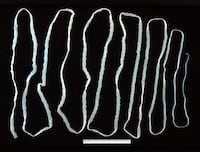
Tapeworm infections (Taeniasis) are found in people that eat raw or undercooked meat or fish. These giant worms come from pork, beef, and fish.
The common signs and symptoms of Tapeworms are:
- diarrhea
- fatigue
- chronic hunger
- weakness
- constipation
- anemia
- weight loss
- abdominal pain
Worldwide, more than 60 million people are infected with beef tapeworms (Taenia saginatum), which can measure 2 to 10 meters.
Beef tapeworms are sometimes so long that the sticks out from the anus and cause perianal symptoms. These tapeworms can live for 25 years in the host. Usually, only one worm is found.
About 4 million people are infected with pork tapeworms (Taenia solium) around the world. These tapeworms are usually 2 to 8 meters long.
Pork tapeworm larvae can migrate to different parts of the body, including the brain, causing epilepsy, headaches, seizures or other neurological disorders, and even sudden death.
The largest tapeworms found in humans are called Broad tapeworms. The eggs are usually ingested when eating sushi or raw fish from freshwater or farms.
The larvae will grow in the intestines and will take three to six weeks to be fully grown. Fish tapeworm infections come from the parasite Diphyllobothrium latum and are most common in America, Eastern Europe, and Scandinavian countries, where we eat fish.
Tapeworms from fish can reach a length of more than 10 meters!
During our program, it is not surprising to see a tapeworm exit the body during an enema.
Check out this page to see pictures *warning, graphic images
How do We Catch Parasites?
Eating undercooked meat or fish
Yes, if you eat sushi, you probably have parasites!
Before infecting humans, parasites can start their life cycle in animals. They live in the gut of the animals, and their eggs can be found in their muscles (in the flesh you eat).
Sushi and tar-tar are so popular now. People eat raw fish once a week or more because they love it! It is not surprising that tapeworm infections are so common these days…
Cooking meat and fish products will kill the worms. However, the eggs won’t be killed. They are still in contact with your knives, cutting board and hands, and can be ingested.
International Traveling
Visiting developing countries is one of the main risk factors for getting parasites. Over there, the water might be contaminated with parasite eggs. In developed countries, we treat the water with chlorine in order to kill all bacteria and parasites.
In many areas of Africa, South America, Asia, and India, it is very common that food is grown in soil mixed with human feces, which are often infected with parasites.
When traveling:
- make sure to avoid drinking the tap water
- brush your teeth with bottled water
- avoid meat and fish markets
- avoid raw food in a restaurant, they probably use tap water to wash the fruits and veggies (if washing)
Poor Hygiene
Parasites can be passed around with a handshake, on door handles, dishes, and clothes.
Washing your hands after visiting the bathroom can help prevent infections. If you are infected and do not wash your hands after pooping, you can infect others, and you can also reinfect yourself when you put your fingers in your mouth.
People who bite their nails are at high risk of getting infected with parasites.
Pinworms are commonly transmitted in children, at school, and at daycare. They scratch their anus and do not wash their hands after. The eggs are then passed around holding hands, with toys and food.
If your child complains of having an itchy anus, you should treat the whole family for pinworms and carefully wash all towels and beddings daily.
Owning a Pet
Pet animals like dogs and cats carry many bugs that can be transmitted with cuddles and kisses. They walk around, sniffing each other’s behind, bringing all sorts of parasites into the house.
Different types of worms can infect dogs and cats: heartworms, roundworms, hookworms, tapeworms, and whipworms. Pinworm cannot live in our pets, but their eggs can be found in their fur and passed to you with a kiss.
Clean your pets often and avoid contact with your mouth. Deworm them every six months to make sure they do not infect your family. This will save you a lot of trouble.
Walking Barefoot
If you walk on contaminated soil with infected feces, parasites like Hookworms can get through your skin from the bottom of your feet. They hook their sharp teeth into your intestines, feeding off your blood and leaving you with anemia.
Always wear shoes outside and take them off when you get into the house. Walking with your shoes inside is as bad as walking barefoot outside!
Wear slippers or socks at home if you have animals! This will prevent you from stepping on eggs and bringing them into your bed. Always wash your hands after touching your feet.
How to Kill Worms
There are different types of treatments for parasites and worms. Drug therapies are very effective but highly toxic. The medication will kill adult worms but not always the eggs, so the treatment might have to be repeated.
Conventional treatments include drugs like Mebendazole, Ivermectin, and Albendazole. Your doctor will decide which one is best for the type of infection you have.
You may take a single dose and repeat it two weeks later, or your doctor may prescribe a 5 to 14-day treatment. You should get a new stool sample during the following month. Treatments are often prescribed in two cycles, separated with a week off, to avoid liver diseases and toxicity.
Natural treatment for parasites
The best way to kill parasites naturally and safely is to go through a complete detox program that involves fasting and colon cleansing.
Parasite cleanse diets and natural parasite treatments are great, but eliminating the food at one point during your cleanse will actually starve the adult parasites and kill them. They will then be flushed with enemas.
OMDetox has selected natural ingredients to help kill parasites while you fast, allowing you to regain your health and normal balance. Doing a cleanse permits to gently detach the dead worms, their toxic waste and their eggs from the intestinal walls. The detox drinks have the ability to absorb the toxins left behind, leaving your bowels free of all those harmful pathogens.
When fasting, most people that have parasites will expel them during their enema. This usually happens around day 4 or 5 of our 7 Day Detox program and will continue throughout the rest of the program. Worms will be passed in most bowel movements until they are gone or when the food is reintroduced.
It is important to do enemas with any treatment you choose. When adult female worms are killed, they are filled with eggs. Your intestines will “digest” the dead worms, but the eggs and larvae can reinfect you. This is one of the reasons why we include an enema kit in our cleanse program.
A natural parasite treatment can be done at the same time as you do a detox. Fasting will only increase the effectiveness of your herbal treatment. Depriving the worms of their food, while feeding them with herbs that kill them, will give them no choice but to abandon ship.
If you were unaware that you were infected with parasites before starting your cleanse, and that you start flushing worms during the program, we encourage you to get a stool sample two weeks after your detox, to make sure they are gone. If there are more, you should get a parasite treatment of your choice and get tested again, two weeks later. *
Our fasting and colon cleansing program is incredibly powerful and can kill all the adult worms living inside you. Although, if you would like to add a natural parasite treatment to your cleanse, we recommend these:
Unlike conventional treatments like Albendazole that take only one dose, natural treatments can take up to 3 months! This is another reason to speed up the process with our 7-day program. Do you really want to stay infected with parasites for an additional 3 months??
Avoiding sugars (including fruits) and processed foods is important when you do your cleanse. Consuming anti-fungal foods like turmeric, garlic, clove, onion, hot peppers, oregano oil, and grapeseed extract has also been shown to be effective. Eat bitter food like kale, arugula, dandelion, and all other types of leaves.
Do a couple of weeks of cleansing with a strict anti-parasite diet and a natural parasite treatment, then move on to the next phase, the fasting phase with our 7-day cleanse program. You will get amazing results and you will finally free yourself of the parasites that are ruining your health.
[omdetox_newsletter]


